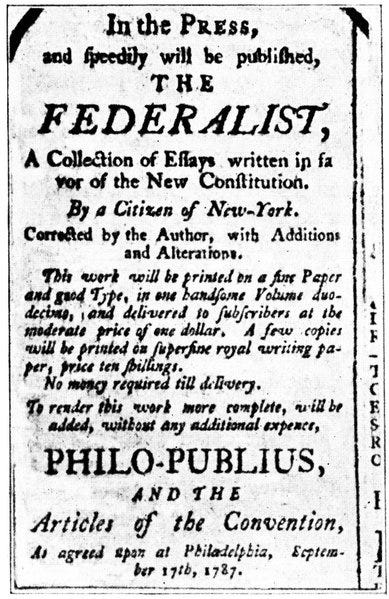Briefing:
Focus: Federalist Papers 1-10, focus on the need for a strong and unified federal government as proposed in the new Constitution.
Key Themes:
The Imperative of Union: A strong and unified nation is essential for the safety, prosperity, and liberty of the American people. John Jay (Federalist 2) emphasizes this point, stating that "Providence has been pleased to give this one connected country to one united people." He further argues that a united America enjoys significant advantages in foreign policy and trade negotiations.
Dangers of Disunion: The papers meticulously detail the potential dangers of disunion, both from external threats and internal conflict. Alexander Hamilton (Federalist 1) warns that rejecting the Constitution could lead to "the general misfortune of mankind." He further highlights the risks of foreign manipulation, economic instability, and interstate conflicts arising from territorial disputes and trade rivalries (Federalist 6 & 7). Hamilton (Federalist 8) paints a stark picture of war between states, predicting "plunder and devastation" as a consequence of disunity.
Necessity of an Energetic National Government: The authors argue that a weak, decentralized government, as exemplified by the Articles of Confederation, cannot effectively address the challenges facing the new nation. They advocate for a federal government with sufficient power to regulate commerce, provide for the common defense, and ensure domestic tranquility. John Jay (Federalist 3) argues that a national government will attract the "best men in the country" to manage its affairs, leading to "more wise, systematical, and judicious" decisions.
Addressing Factions: James Madison (Federalist 10) provides a comprehensive analysis of the dangers posed by factions, which he defines as groups of citizens united by a common interest, potentially adverse to the rights of other citizens or the community as a whole. He argues that a large republic, as envisioned in the proposed Constitution, is better equipped to control factions due to the increased diversity of interests and the difficulty of forming oppressive majorities.
Important Facts and Ideas:
Rejection of the Constitution equates to dismemberment of the Union. (Federalist 1)
Geographical unity and shared heritage make America naturally suited to be one nation. (Federalist 2)
A national government will be better equipped to handle foreign relations, upholding treaties and international law. (Federalist 3)
Weakness and division invite foreign hostility and exploitation. (Federalist 4 & 5)
History demonstrates that even republics are prone to war, driven by ambition, rivalry, and economic interests. (Federalist 6)
Territorial disputes, trade competition, and public debt management pose significant risks for interstate conflict. (Federalist 7)
Standing armies, though potentially dangerous to liberty, are an inevitable consequence of disunion and constant threat of war. (Federalist 8)
Montesquieu's arguments for small republics can be reconciled with a large confederate republic, offering both internal and external advantages. (Federalist 9)
A large republic with a representative government is the best defense against the tyranny of faction. (Federalist 10)
Notable Quotes:
"A torrent of angry and malignant passions will be let loose." (Federalist 1, Hamilton)
"This country and this people seem to have been made for each other." (Federalist 2, Jay)
"The administration, the political counsels, and the judicial decisions of the national government will be more wise, systematical, and judicious than those of individual States." (Federalist 3, Jay)
"They will neither love nor trust one another, but on the contrary would be a prey to discord, jealousy, and mutual injuries." (Federalist 5, Jay)
"To look for a continuation of harmony between a number of independent, unconnected sovereignties in the same neighborhood, would be to disregard the uniform course of human events." (Federalist 6, Hamilton)
"We should be ready to denominate injuries those things which were in reality the justifiable acts of independent sovereignties consulting a distinct interest." (Federalist 7, Hamilton)
"Safety from external danger is the most powerful director of national conduct." (Federalist 8, Hamilton)
"In the extent and proper structure of the Union, therefore, we behold a republican remedy for the diseases most incident to republican government." (Federalist 10, Madison)
Conclusion:
Federalist Papers 1-10 make a powerful case for the adoption of the Constitution and the establishment of a strong, unified national government. The authors skillfully leverage historical examples, philosophical arguments, and insightful analysis to demonstrate the dangers of disunion and the benefits of a well-constructed federal republic. These foundational papers lay the groundwork for understanding the principles and motivations behind the creation of the American system of government.



